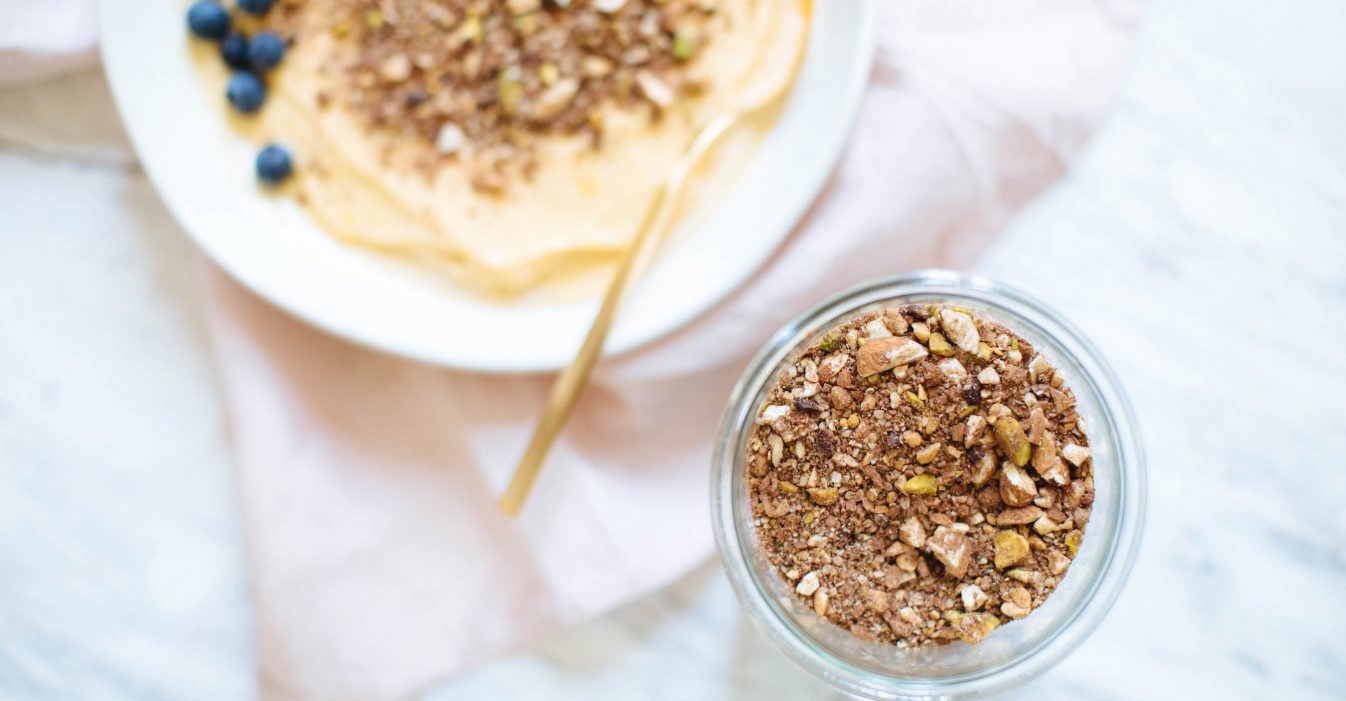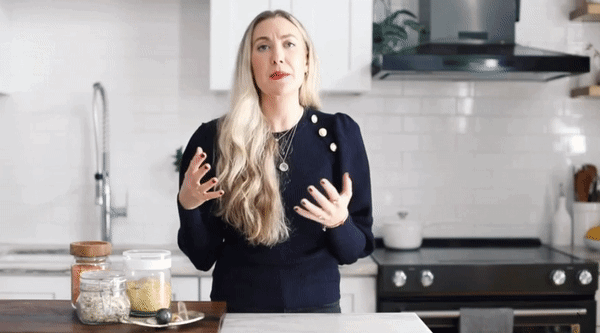There’s a lot we can do to improve our heart health and give it a little extra love — it’s crucial to protect your bodies’ most important muscle.
About one in four people die of heart disease every year — in fact, it’s the number-one cause of death among women and men (7). Scary I know, but that doesn’t mean you can’t take action into your own hands when it comes to your diet, lifestyle, and mental/emotional/spiritual wellbeing. To help you feel empowered to take charge of your health, I’m pointing out the best ways to boost your heart health so you can live happier and healthier — with a strong heart. Implement these tactics into your own life with the easy applications I explain and know you’re doing your heart some good with these strategies.
What Does the Heart Do?
The heart’s biggest responsibility is to pump blood throughout the body through the circulatory system, giving oxygen and nutrients to all our tissues and removing any waste or carbon dioxide. A normal heartbeat means blood is pumped at a regular, controlled pace throughout the body, thanks to the body’s natural pacemaker known as the sinoatrial node.
The human heart is an organ that pumps blood throughout the body via the circulatory system, supplying oxygen and nutrients to the tissues and removing carbon dioxide and other wastes.
The most common type of heart disease, known as coronary disease, is a disorder in the blood vessels of the heart (8). It can increase the risk of heart attack, which occurs when an artery gets blocked and cuts off oxygen and nutrients going to the heart.
What are the Leading Causes of Heart Disease
There are two types of heart disease risk factors: those you can’t control and those you can. The former includes a family history of heart disease and age, which becomes at risk factor at 55 for women and 45 for men (8).
As far as your lifestyle and what you can control, a few things to note that up your risk of heart disease: smoking, high blood pressure, high blood cholesterol (the top three lifestyle risk factors), being overweight or obese, physical inactivity, and diabetes (8). An unhealthy diet (including eating foods high in trans fats and saturated fats, and having lots of salt), as well as excessive alcohol intake, can also up your risk, according to the CDC. If you can check off a few of these factors, then that increases your risk even more.
To help you form a healthier, heart-happy lifestyle, check out concrete ways to decrease your risk below.
How to Protect Your Heart Health
1. Exercise Often For Heart Health
Staying active isn’t just about burning calories, but keeping your body healthy and your mind happy, too. One recent study says that even if heart disease does run in your family, exercise is your best defense (1). While the research doesn’t point out exactly what type of exercise is best or how much, it does mention that cardiovascular fitness (say, running, walking, or biking), as well as grip strength and just more physical activity each day, will help your heart. In fact, more of each of these types of movement will reduce your risk of heart attacks and strokes.
Try taking more walks throughout the day, even if it’s a casual stroll around the block after dinner. You can also try a HIIT workout or high-intensity interval training, which involves doing short bursts of all-out effort, followed by brief rest periods. Read more about it here.
2. Follow a Plant-Based Diet For Heart Health
Yes, your food choices can affect your heart, and as you know at NS, we’re major proponents of following a plant-centric meal plan. Research shows that the antioxidants and other ingredients in a produce-heavy diet protect against coronary artery disease, or damage or disease in the heart’s main blood vessels (3).
While you can still occasionally enjoy meat, especially if you really enjoy it, your main goal for a plant-based lifestyle is to get lots of vegetables and fruit throughout your day, as well as whole grains, nuts, and legumes. Read about specific ideas for plant-based diets in this story, where you’ll also find ideas for meals. Also, here are a few of my very favorite recipes to replace a few typical animal products:
Tahini Miso Covered Cauliflower Steaks
The Best Black Bean Burger
Vegetarian Meatloaf
Classic Cashew Cheese
3. Eat More Nuts For Heart Health
I love nuts of all kinds, so I’m always happy to know that this healthy fat- and protein-filled foods help improve heart health, not to mention taste delicious and keep you feeling full. One major study linked eating nuts to a lower risk of cardiovascular disease, as well as coronary heart disease (4).
Though any nuts will fit the heart health bill, researchers specifically suggested eating a serving of peanuts and tree nuts two or more times a week and walnuts one or more times a week. They found doing so was associated with a 13% to 19% reduction in cardiovascular disease risk, and a 15% and 23% lowered risk of coronary heart disease.
Of course, a handful of nuts works well as a simple snack (try this spicy sweet nut and seed mix for added flavor), but you can also add them to main meals. Here are a few of my favorite recipes, featuring nuts:
Chocolate Cinnamon Walnut Chili
Apple Ribbons with Basil Walnut Pesto
10-Minute Peanut Stir Fry
4. Drink Some Coffee For Heart Health
Sipping a cup of caffeine in the morning won’t just give you a jolt of adrenaline to wake up, but it could also protect your heart. (Good news for anyone who can’t start the day without it!) While there’s lots of research out there about the benefits of coffee, particularly on the heart, recent science looked at the mechanism of action behind it (keep in mind, the study involved animals) (5).
The researchers noted that four or more cups of java improved the function of endothelial cells, which line the interior of blood cells. The caffeine promoted the movement of a protein, called p27, into mitochondria (cell’s energy powerhouses) which then led to the endothelial cells protecting the heart muscle cells.
It’s easy to get your fill of coffee when you have a few delicious, make-at-home recipes. Try these three:
Coffee, Elevated
The Mint Mocha Steamer
Mood-Boosting Cocoa Smoothie
5. Meditate Daily For Heart Health
Meditating and mindfulness will not only help your mind but your body, too. Science proves this in a new small study that found that just 60 minutes of meditating can improve markers of heart health (6). After that hour of relaxation, the subjects actually had lower resting heart rates and a reduction in aortic pulsatile load, or the change in blood pressure for each heart beat, multiplied by heart rate—two signs of good heart health.
Stress can cause havoc on the body, so meditating is a good way to help calm down, get centered, and help improve your physical health. You can find a few of my go-to strategies for sneaking in meditation and more mindful moments in this post. Also, learn 10 ways to easily de-stress by reading this article.
Let’s Hear It!
Was this article useful to you? Did you already start implementing these strategies in your daily life? Let me know in the comments below or feel free to share your story on social using #nutritionstripped.
References
- Erik Ingelsson, M.D., Ph.D. Standford University School of Medicine. (2018, April.) When heart disease runs in the family, exercise may be best defense.
- Marigliano, Elisabeth, Fahs, Pamela Stewart, Ludden, Cristina. (2016, November.) Walking for Heart Health: A Study of Adult Women in Rural New York.
- Phillip Tuso, MD, FACP, FASN, Scott R Stoll, MD, William W Li, MD. (2015, Winter.) A Plant-Based Diet, Atherogenesis, and Coronary Artery Disease Prevention.
- Guasch-Ferré M, Liu X, Malik VS, Sun Q, Willett WC, Manson JE, Rexrode KM, Li Y, Hu FB, Bhupathiraju SN. (2017, November.) Nut Consumption and Risk of Cardiovascular Disease.
- Niloofar Ale-Agha, Christine Goy, Philipp Jakobs, Ioakim Spyridopoulos, Stefanie Gonnissen, Nadine Dyballa-Rukes, Karin Aufenvenne, Florian von Ameln, Mark Zurek, Tim Spannbrucker, Olaf Eckermann, Sascha Jakob, Simone Gorressen, Marcel Abrams, Maria Grandoch, Jens W. Fischer, Karl Köhrer, René Deenen, Klaus Unfried, Joachim Altschmied, Judith Haendeler. (2018, June.) CDKN1B/p27 is localized in mitochondria and improves respiration-dependent processes in the cardiovascular system—New mode of action for caffeine.
- Michigan Technological University. (2018, April.) Meditation could help anxiety and cardiovascular health.
- Heart Disease Facts. Centers for Disease Control and Prevention.
- The Heart Truth for Women: If You Have Heart Disease. National Heart, Lung and Blood Institute.
- Heart Disease Behavior. Centers for Disease Control and Prevention.














